#First And Only by Dan Abnett
Explore tagged Tumblr posts
Text
ArtStation - Gaunt's Ghosts
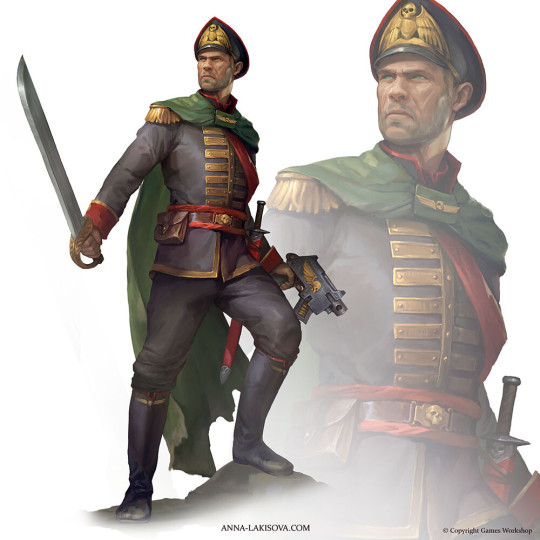

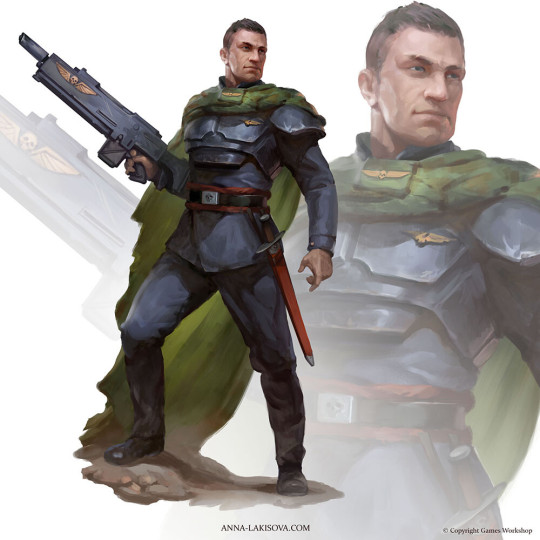


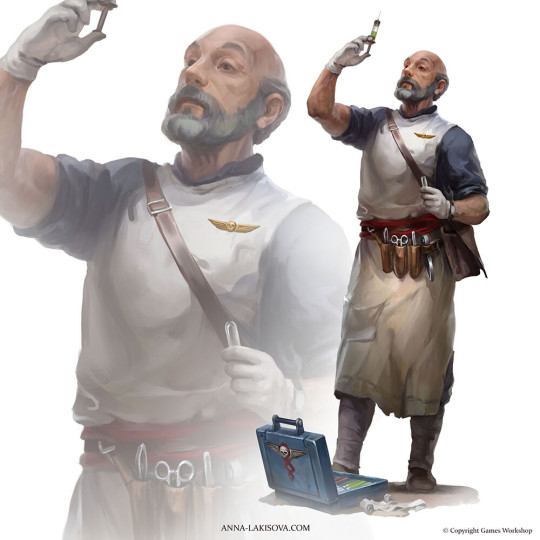


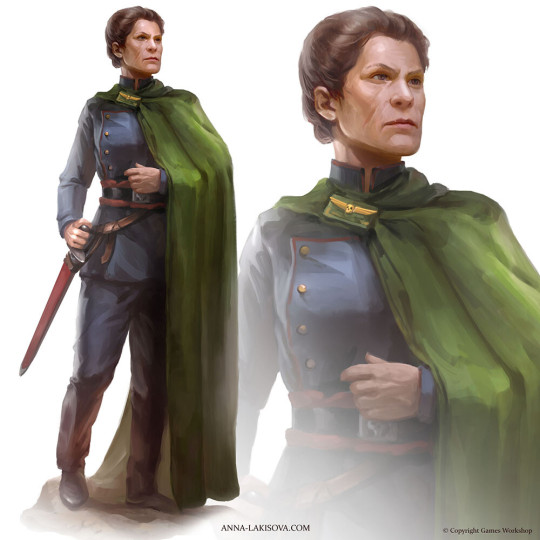
#warhammer 40000#warhammer 40k#wh40k#warhammer40000#warhammer40k#astra militarum#imperial guard#Tanith First#Tanith First-and-Only#Tanith First and Only#Tanith 1st Regiment#Tanith#Fething Tanith#Straight Silver#Scouts#Snipers#Marksmen#Light Infantry#Gaunt's Ghosts#feth#imperium#loyalists#sabbat crusade#Dan Abnett
63 notes
·
View notes
Text
Major Elim Rawne, Tanith First and Only

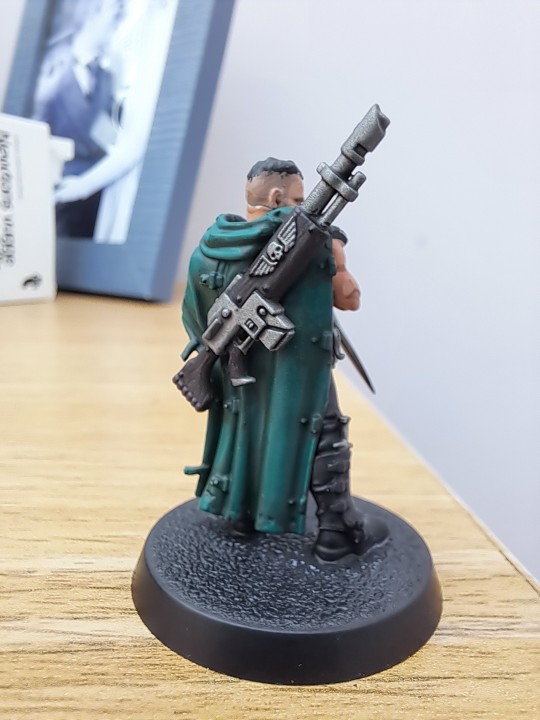
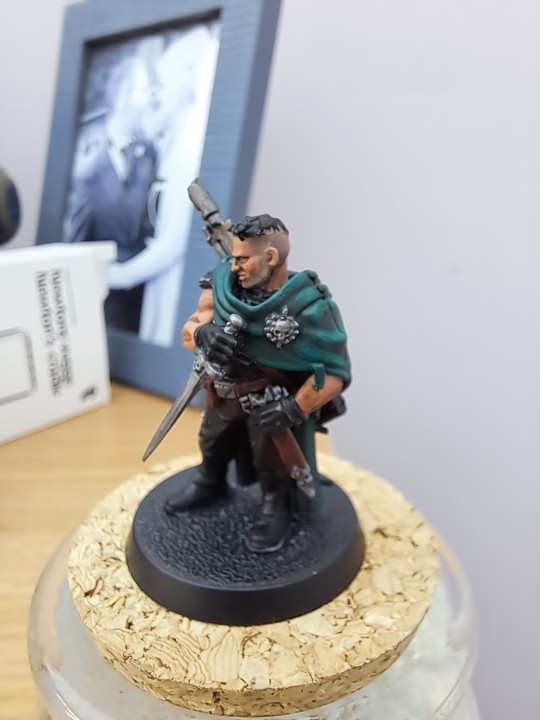
22 notes
·
View notes
Text
𝐍𝐢𝐠𝐡𝐭 𝐋𝐨𝐫𝐝𝐬 𝐂𝐨𝐦𝐩𝐥𝐞𝐭𝐞 𝐁𝐨𝐨𝐤𝐬 𝐋𝐢𝐬𝐭 𝐢𝐧 𝐜𝐡𝐫𝐨𝐧𝐨𝐥𝐨𝐠𝐢𝐜𝐚𝐥 𝐨𝐫𝐝𝐞𝐫.
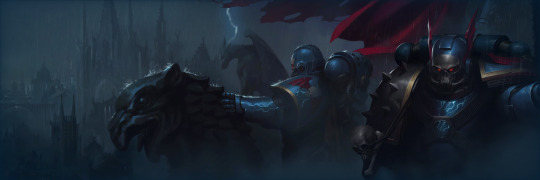
Key points:
Blue text means it's a short story or a novel
The bat 🦇 means Konrad is present
The knife 🔪 means Sevatar is present
Many of these cover a vast timeline: I've put them in this order based on the narrator (example: Vulkan speaking about Nostramo just before Istvaan) or the first chapter (Child of Night starts immediately after Nikaea but ends during the HH)
I ignored books where they appear for 1 line only and do nothing important. I also ignored "Lion: son of the Forest" because that thing is actually a warp-thing and not the real Konny.
𝐂𝐫𝐮𝐬𝐚𝐝𝐞
Sigismund: the eternal crusader , by John French (🔪)
Konrad Curze: A lesson in darkness, by Ian St. Martin (🦇) [AUDIODRAMA]
The Abyssal Edge, by ADB (🦇) (🔪)
The Dark King, by Graham McNeill (🦇)
Child of Night, by John French (🔪)
𝐇𝐨𝐫𝐮𝐬 𝐇𝐞𝐫𝐞𝐬𝐲
Artefact, by Nick Kyme (🦇 mentioned)
The first heretic, by ADB (🦇 short appearance) (🔪 has like 2 lines tho)
Massacre, by ADB
Vulkan lives, by Nick Kyme (🦇)
Savage weapons, by ADB (🦇) (🔪)
Prince of crows, by ADB (🦇) (🔪)
The Long night, by ADB (🔪)
Unremembered Empire, by Dan Abnett (🦇 short appearance)
The lightning tower, by Dan Abnett (🦇 mentioned)
A safe and Shadowed place, by Guy Haley
Pharos, by Guy Haley (🦇)
Painted count, by Guy Haley
Angels of Caliban, by Gav Thorpe (🦇)
Ruinstorm, by David Annandale (🦇)
The lost and the Damned, by Guy Haley
The End and the Dead Vol. II, by Dan Abnett
Konrad Curze: The night Haunter, by Guy Haley.(🦇) (🔪)
𝟒𝟎𝐤
Lord of the Night, by Simon Spurrier
Red Tithe, by Robbie Macniven
Soul Hunter, by ADB
Throne of lies, by ADB
Blood Reaver, by ADB
Void Stalker, by ADB
Masters, the bidding, by Matthew Farrer
Nightfall, by Peter Fehervari
Morvenn Vahl: Spear of faith, by Jude Reid
𝐒𝐩𝐞𝐜𝐢𝐚𝐥
Horus Heresy book 2: Massacre (🦇) (🔪)
Horus Heresy book 9: Crusade (🦇) (🔪)
#i shouldn't have forgotten anything#i hope#enjoy#night lords#warhammer 30k#warhammer 40k#primarch#konrad curze#warhammer#warhammer 4000#warhammer lore#jago sevatarion
328 notes
·
View notes
Text
I registered on Tumblr three long years ago and never posted anything. So, what will my first post be about? Something of current interest. Let it be a female Custodian, why not?
BY SLAANESH, THE OFFENDED GUYS' ARSES ARE BURNING SO BRIGHT THAT THERE'S NO NEED FOR THE ASTRONOMICAN IN THE IMPERIUM NIHILUS ANYMORE! *ba-dum tss*
And the vast majority of them - who would've guess! - are straight men. Mind you, I don't want to talk shit about all cishet men - there're lots of good open-minded guys (like my close friends), but their "kin" certainly don't do them justice. Imagine: one single woman in a previously all-male faction can ruin the whole hobby for you! Really? Have you really liked it that much in the first place?
One dude basically typed the whole-ass lecture in reply to my jesting (!) comment (in which I didn't even write that I wanted Girlstodes! I just wrote that ppl, who wanted them, are laughing now!). He acted like some overzealous Dark Apostle. Why? I dunno.
"The Custodes contain the Holy Emperor's gene-seed and are breeded to be loyal only to him! That's why they can't be women!" said this dude... Sorry, WHAT? MFer, your logic is deader than Horus and his soul is fckn obliterated!
Then he wrote that a petition with several thousand signatures needs to be created so that the Custodians remain an exclusively male faction, that GW tries to please the "screaming minority" and that Dan Abnett needs to take his pills. Yes, he was dead-serious.
These guys try to justify themselves this way: "I hate this idea because GW made a retcon and this is against their lore - not because I'm misogynistic and hate women (a-ha, I totally believe you)." Well, I bet that we, girls, wouldn't have started the whole barbaric shit-storm if GW had made the Brother of Battle! Let's be real: you don't care about the lore (or I would've 100% respected your opinion) - you use it as a shield. You only care about your ego - so fragile that it can be broken by one single blow, like a crystal glass.
I can understand why some ppl don't like the female Astartes: the Primarch's gene-seed is required for their creation and it's only male-compatible canonically. But the Custodians are created in a completely different way! Their genetics is altered on the molecular level with some unreal and long-forgotten science-sorcery. The Emperor basically made the pinnacle of human creation. Only the men can be the "pinnacle", eh? The duality of life as it is, lmao.
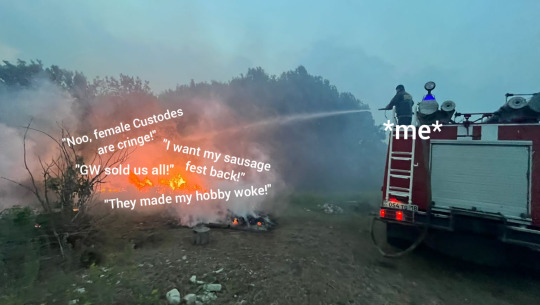
#warhammer 40k#warhammer 40000#wh40k#adeptus custodes#female custodes#2.5m tall warrior-scholar woman is a win-win
62 notes
·
View notes
Note
hiii hello! i main rocket in marvel rivals and got curious if someone wrote fics w him, found yours and now I'm absolutely obsessed🫶 you made me fall in love with rocket and the way you write is incredible, i feel so lucky that i still have lots of your fics to read :'3
is there any particular comics involving rocket that you like and/or you'd recommend? i think I've only read like 3 comics in my life lol but now i want to see more of rocket and know the context of some things i read in your fics.
i hope to see more of your writings 🫶 thank you for sharing them to the world 🫶🫶🫶
oh my GOD, nonnie ♡♡♡ i am so glad you're enjoying marvel rivals ~ and i'm so grateful it brought you to the fandom lol. thank you for the kind words, and for reading my silly stories! it truly means so much that you would come here and let me know, and i really appreciate it ♡♡ also, i love questions in general, but this is one of my favorite kinds of questions. thank you for asking!
a suggestion: if you are gonna binge-read and don't particularly care about having the physical comics in your hands, i highly recommend getting the Marvel Unlimited app (it's about $10 USD a month, i think). it's not always super-intuitive but i do believe all of these comics are on it! that said, i do have a lot of the comics in the first list in hardcopy because the art is ♡♡♡
I am also hoping some of the other folks out here will weigh in with their favorite recs (@mrwolfhare comes to mind as someone who has excellent insight into the best Rocket arcs and i would say like... an encyclopedic knowledge of the comics).
Here are some of my absolute faves though, in order from my most favorite to my least favorite (they are still all my favorites though):
Rocket Raccoon: Grounded. Rocket Raccoon (2016-2017) by Matthew Rosenberg and Jorge Coehlo. Prior to this arc, the Guardians come to Earth to assist with the evil du jour. Their ship ends up getting destroyed and they get into a fight, resulting in all the Guardians going their separate ways. This is Rocket's story of being grounded in New York City.
Rocket: The Blue River Score. Rocket (2017) by Al Ewing , Adam Gorham, etc. During (yet another?) fight amongst the Guardians, Rocket goes off on his own to sulk and runs into an old love interest, who cons him into getting involved in a classic heist.
Rocket Raccoon Vol. 1: A Chasing Tale. Rocket Raccoon (2014-2015) by Skottie Young and Jake Parker Rocket is hunted haunted by his past. This comic has some of the most beautifully-colored art and is just....fucking fun.
Rocket Raccoon Vol. 2: Storytailer. Rocket Raccoon (2014-2015) | by Skottie Young, Filipe Andrade, etc. Groot and Rocket recount some of their old adventures. This collection contains one of my favorite short arcs, The Cold.
Groot Groot (2015) by Jeff Loveness, Declan Shalvey, etc. Obviously, this comic is more Groot-centered than Rocket-centered but it's my favorite comic of all time and I still highly recommend.
Rocket Raccoon and Groot Vol. 1: Tricks of the Trade Rocket Raccoon and Groot (2016) by Skottie Young, Filipe Andrade, etc
Rocket Raccoon and Groot Vol. 2: Civil War II Rocket Raccoon and Groot (2016) by Nick Kocher, Michael Walsh, David Lopez.
in no particular order, i'd also recommend the following comics. (tbh a lot of times the other guardians bore me, and the gotg-ensemble comics below don't focus as heavily on rocket as i might like, but they do contain good rocket moments!)
Guardians of the Galaxy Guardians of the Galaxy (2019) 1-12 by Donny Cates, Al Ewing, etc.
Guardians of The Galaxy: Then It's Us Guardians Of The Galaxy (2020-2021) by Al Ewing, Juann Cabal, etc.
Guardians of the Galaxy: Guardians of Infinity Guardians of the Galaxy (2015-2016) by Dan Abnett , Carlo Barberi, etc.
Star-Lord: Annihilation - Conquest Annihilation: Conquest (2014) by Keith Giffen, Nic Klein, etc.
Captain Marvel Vol. 2: Stay Fly Captain Marvel (2014-2015) by Kelly Sue DeConnick, Marcia Takara, etc.
Guardians Of The Galaxy Vol. 1: Grootfall & Vol. 2: Grootrise Guardians Of The Galaxy (2023-2024) by Collin Kelly, Jackson Lanzing, etc.
12 notes
·
View notes
Text
I reread First and Only yesterday and was reminded just how insanely well written the Gaunt's Ghosts novels are. It's not really in the themes or anything, but the sheer technical skill in how Dan Abnett weaves together the plot and subplots, bringing up minor details until, usually within the very last pages, the entire thing comes together to form such a clean narrative. It's just incredibly well executed. The tension keeps until the very last moment and it's breathtaking everytime.
7 notes
·
View notes
Text
The End and the Death Review
What even is there to say about it. It’s over. It has been magnificent.
Looking back on the Horus Heresy back when I started reading it, I can’t believe that this is where we ended up, with such an absolutely beautiful landing.
Whether you like, love or hate these books, they are an achievement without precedent. This kind of narrative, on this scale, with this word count, that amount of different authors, that vision… The fact that it was ever completed is in itself amazing.
The fact that not only it was completed, but in a way that stays true and respectful to existing lore while putting its own spin on it and remaining relevant to its mission statement 18 years ago(!!!!) is nothing short of miraculous.
This final book, written in its dizzying, inspiring present tense opens and closes with effortless grace. Dan Abnett nails the stakes of it all home, he draws the parallels, he twists the knife, again and then again, and again. He explores every urge and emotion, from heroic, to insane, to pathetic, to simply thirsting for life, to bloodthirsty, to nonchalant… Everyone is their best and worst selves simultaneously, every card that must be played is played.
From the desperate end of the siege, to the journey into the Vengeful Spirit, to the duel with Sanguinius and the final confrontation with the Emperor, the book is a constant nail biter and page turner. The stakes are simply too high to put the damn thing down.
There are plenty of Dan Abnettisms throughout, with wild concepts and lore additions (and callbacks to incredibly obscure tidbits of lore) being thrown at the reader consistently and without pause. I have no doubt I will forget most of this book until I have to read it again, and then I will be just as surprised as last time. This is not a bad thing. In an IP where the fandom is so religiously adherent to its version of the lore and characters, a good slap on the face to remind the fan base just who came up with all this crap in the first place is always welcome.
All in all, there is little to say to recommend this book, as its enjoyment hinges on reading upwards of 50 more of them. But what a journey, and what a relief it is, that all these endless hours and days of reading, re-reading, thinking and walking forlornly around town considering the plight of the Emperor and his sons ends as it was promised, with inglorious, raw tragedy, a testament of human folly and defiance both, and for a select few, just a little bit of comedy. The gods laugh, but Terra stands. And there is no way to adequately describe the Horus Heresy’s impact.
You just had to have been there, when Horus slew the Emperor.
27 notes
·
View notes
Text
I do think we need to take more lessons from Dan Abnett when writing 40K. The guy threw Men of Iron into the first Gaunt’s Ghosts book, he has invented narrative devices and actual devices that only really get used in his stories, for example the Ravenor and Bequin books make ample use of blank limiters that just… turn off the effects of being soulless? How, Dan? I don’t really care how, it’s cool as hell. But the guy just does what he needs to, he makes things like the Dark King and the King in Yellow happen, he names characters silly shit without fear, and he invents new words whenever he wants… and somehow, the guy just sells it! He rarely misses! It becomes 40K.
The End and the Death is heavily influencing the Rogue Trader game I’ll be GMing soon, that’s for sure. I was planning on making things a little more gritty and down to earth, but after this, I think I need to go big. Go weird, play with the fact that the Kornous expanse is a fairly stable region of space caged in by multiple warp storms, play with the fact that this is widely unexplored. Anything could happen, anything could show up, from named characters who the party has no hope in surviving, to obscure fragments of forgotten lore that has been “retconned” ages ago.
28 notes
·
View notes
Text

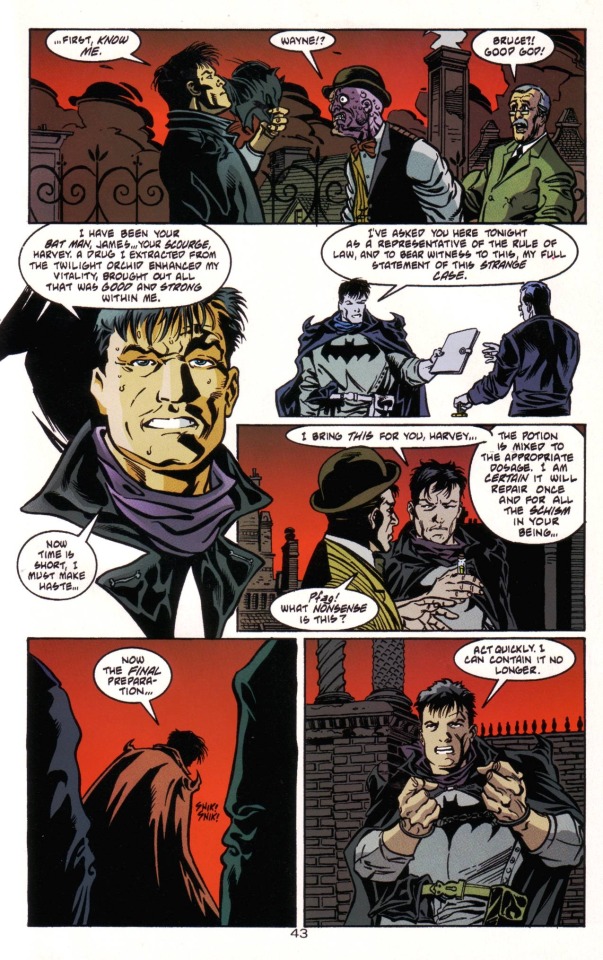
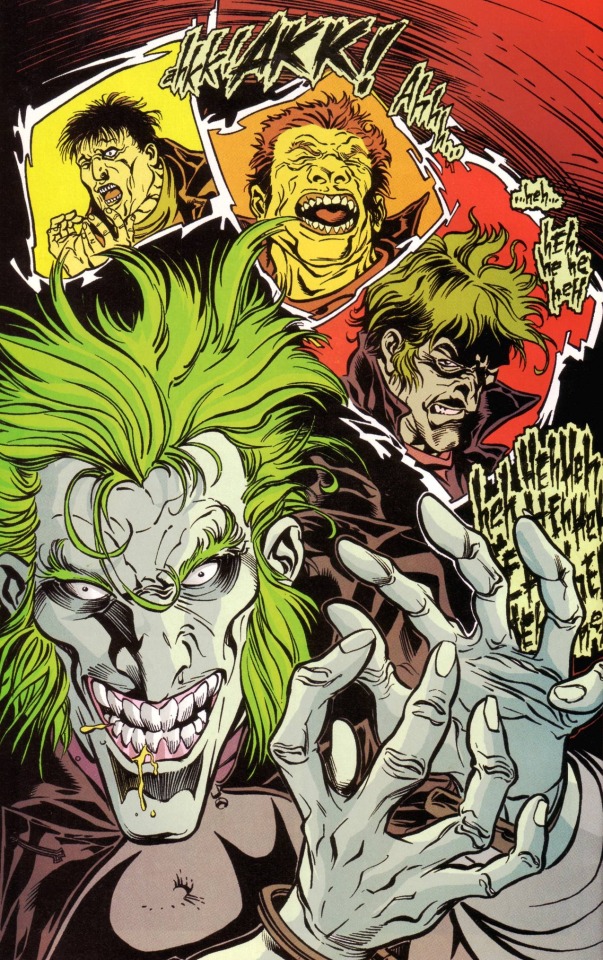
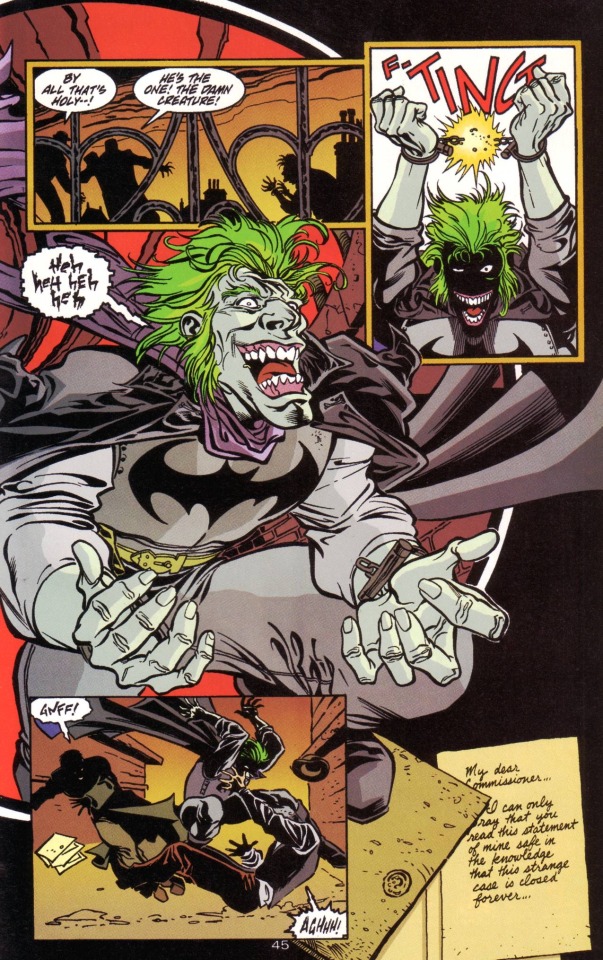
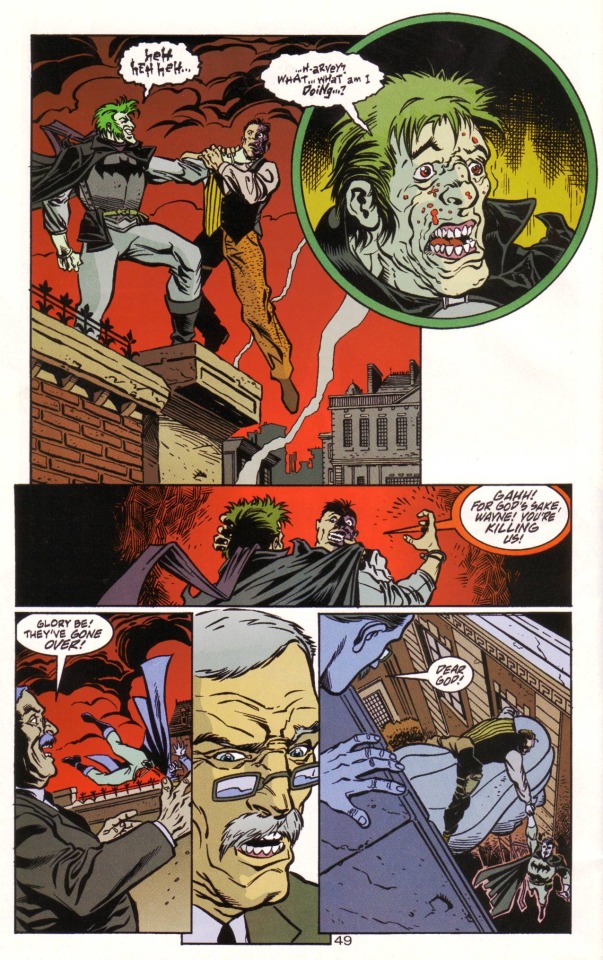

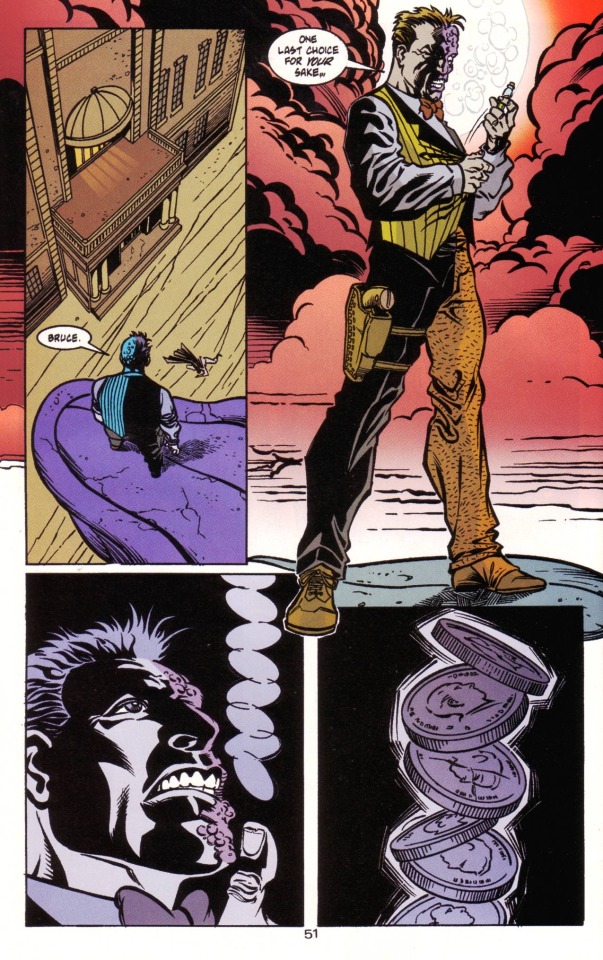


“My dear Commissioner… I can only pray that you read this statement of mine safe in the knowledge that this strange case is closed forever…
“I affirm that my only intent had been to heal poor Harvey and restore to us the good, true man we all knew. The distillation I made to this end had wondrous powers, but I should have never tested it on myself… for it polarized the extremes of my nature, extremes that usually held each other in check.
“At first, my good self was brought forth, strong and vigorous and upright. But just as night follows day, the evil matter of my soul was able to manifest itself, pure and foul and unrestrained. The Bat-Man… the Joker… good and evil… two sides of a human coin. This is what my potion created.
“For Harvey, already split, I am sure it will be a genuine cure. But for a normal, balanced man… James, I pray that you and God will forgive me.
“Bruce Wayne, Gotham,
Anno Domini 1886.”
From Batman: Two Faces (1998), written by Dan Abnett and Andy Lanning, art by Anthony Williams and Tom Palmer.
#batman#harvey dent#jim gordon#twoface#two face#dr jekyll and mr hyde#elseworlds#james gordon#bruce wayne#dan abnett#andy lanning#anthony williams#tom palmer#harvey bullock#joker#the joker
107 notes
·
View notes
Text
lizardreading wrapped 2024
i was a huuuuge reader when i was younger, and then eventually i fell out of that somehow. but this year i finally managed get back into a more or less consistent reading habit, so imma blab about that
STATS


(powered by Storygraph, will probably update these when december is over lol)
BEST OF
The Instant Fav: The Sapling Cage by Margaret Killjoy usually, "fantasy YA" is something i do not care about. at all. i didn't particularly care about teenage protagonists back when i was that age, i do not now. and run-of-the-mill european-medieval-coded fantasy also isn't my thing. at all. BUT when Margaret Killjoy, who is amazing and great and such a cool person, brings out her first real novel (after a bunch of novellas and short stories which i also enjoyed a bunch), guess i have to read it. AND IT'S SO GOOD. it's exciting and funny and tragic and hopeful and queer af and well written and i just really really loved it. go read it y'all. [favorite line]
The Slow Burn: Annihilation by Jeff VanderMeer been meaning to read this one for ages, because i love the movie so much, although i heard people either like the movie or the book. and i did enjoy it well enough, read the next 2 books too, it was.. nice. i think i gave it 4.5/5 initially. and then i couldn't stop thinking about it. re-read parts, read about it, hyperfocused. people always go on about how they want a relatable protagonist, but i don't think i ever actually had a character like that. well, hello Biologist. she's just like me fr. if i were a biologist. anyway, this book tickles something inside me. maybe it's the autism. [favorite line] [another favorite line]
The Surprise Hit: The Magos by Dan Abnett when you ask the internet "which warhammer 40k book is a good starting point", the Eisenhorn trilogy usually gets recommended. what doesn't get mentioned is "well, that one actually belongs to 2 more trilogies and another novel and a bunch of short stories". started, felt entertained enough to continue, had my fun. they're not great, the first 3 Eisenhorn ones have the weirdest-ass pacing, Eisenhorn himself is a dramatic bitch, but overall good enough. Ravenor trilogy is ok. the short stories inbetween range from :shrug_emoji: to good enough. (Bequin on the other hand is really really good) and in comes The Magos. suddenly the pov character is not some larger than life inquisitor doing god's the emperor's work, but the saddest wettest little nerd way in over his head. and he hates all this daemon- and chaos-bullshit and all the guns and the blood and just wants to go home to his books and he cries and he pukes from all the gore, and his ex wife is there too, and he mouthes off to FamousTM ScaryTM InquisitorTM Eisenhorn because it's all bullshit, and you just wanna wrap him in a blanket. and of course he saves the day eventually. i'd die for Valentin Drusher. [favorite line]
The Old Fav: Arbeit und Struktur by Wolfgang Herrndorf sorry to the english speakers, but this one is german only. it's not even fiction. it's the blog of an author after he got diagnosed with a brain tumor, documenting his last few years, slapped into a book after his death. i don't know how many times i've read this one over the years. going on 10 maybe? twice this year for some reason. and it hits me every time in a way i can't put into words. one of my alltime favs. mildly funny (?) sidenote: i can't for the life me of get into the fiction writing of this guy. i tried, multiple times. sorry dude. [favorite line]
4 notes
·
View notes
Text
Horus Rising Parts 2 and 3: Brotherhood in Spiderland and The Dreadful Sagittary
This post contains spoilers for Brotherhood in Spiderland and the Dreadful Sagittary, the second and third parts (together comprising roughly the second half) of Horus Rising by Dan Abnett, first published as a novel on (as nearly as I can tell) April 6th, 2006.
Unlike the first half of the book, where I have reservations, I pretty much don't have anything negative to say about the second half. I think it's deft storytelling that does what it intends to do and effectively sets up a tragedy that False Gods will, if I recall correctly, fail to deliver on. There's one specific part that's a bit on the nose; I'll get to that.
Basically four things happen in the second half of the book. The 63rd Expeditionary Fleet go to (ultimately embarassingly pointless) war against a planet of giant spider-aliens to rescue a group of Emperor's Children who are themselves there to rescue a group of Blood Angels; Loken is introduced to the Davinite Lodge secret societies; Loken is introduced to the horrors of the Warp; and Horus meets and fails to make peace with a much more enlightened integrated human/alien society called the interex, testing out a tragic could-have-been version of rebellion against the Emperor, which also, I feel, clarifies his urge to rebel somewhat.
So! I really, really like Brotherhood in Spiderland, and not just because it's called Brotherhood in Spiderland. It's well-written bolter porn that serves as a critique of bolter porn. Blood Angels throw themselves at a death planet, which is so hostile that you can only get there by drop pod and then can't leave because of weaponized weather, botch it so badly they name the planet Murder, ask for help. Emperor's Children, who are largely arrogant assholes, show up and decide to help by throwing themselves into the exact same blender. We meet Eidolon, Lucius, and Saul Tarvitz, who accidentally clears a hole in the weaponized weather, then our 63rd Expeditionary Fleet shows up to save the day, Tarik Torgaddon arrives, and then Tarik, Saul, and Lucius get up some Big Soldierly Brotherhood Feels bits that would be familiar to anyone who's a fan of the Clone Wars series, with even notorious future villain Lucius getting a humanizing moment. We're then told they wage a pure glorious war of extermination against the spider aliens for six months, performing many awesome feats of glory and heroism… and then an interex ship shows up and goes "Hey, why are you attacking our nature preserve? Didn't you see the beacons we set up that clearly say not to go down to the planet we moved the spider-monsters to after taking away their space flight tech so we and they could co-exist peacefully?" The whole glorious six month war full of brotherly feels and tragic deaths and heroic accomplishments was all just the 63rd Expeditionary Fleet attacking a lion habitat at the space zoo because they couldn't read the sign, just stickin' a series of hands in a series of wild animal mouths because Imperial doctrine demands it no matter how pointless it is. Womp womp. This makes it sound silly but it's great and it serves the themes of the book, I don't really have critique here, it's all well-enough executed that I'm satisfied just kinda describing the events as they happen. Whatever the hell glorification of the Imperium would look like, this isn't that, no matter what YouTube lore shorts that describe the Megarachnids as terrifyingly deadly alien threats would have you believe. They're big spiders that want to eat you because they're big spiders, you can just not go down there and you'll be fine.
Meanwhile, Loken is inducted into one of the Luna Wolves' secret warrior lodges, which is… cool and chill and doesn't seem to be a cult. Maybe it's a bit love-bomb-y but giving these strictly regimented emotionally stunted child soldiers a place to just be people does seem like a good idea, even as Loken points out that their secrecy could make them problems even if they're fine right now. Again, this is set up as an effective tragedy -- we, the audience, know that the Davinite lodges will ultimately be the cancer that rots the traitor legions from within through secret chaos cult infiltraton, so the book sells them as something fulfilling a genuine social and emotional need as the buildup to that tragedy and as an implicit critique of how official Space Marine social organization fails them as people and forces their emotional lives into the closet where they can be victims of manipulation. Good section! Smart writing! Even here it's clear that the Heresy is going to go down not just because of the ambition of Horus and the machinations of the Ruinous Powers, but because the Emperor opened the way for them by refusing to recognize the Astartes as people. The only reason the secret warrior lodges are secret is because the Emperor doesn't like them, because they don't involve his soldiers spending all their time lining up in neat rows.
Also Loken gets pointed to an epic Unification-era war poem where he finds references to daemonic possession that match his experence with Samus and Xayver Jubal, and all I can think is, this is great, I wish the bit in Part 1 where Horus just explains what went down had been written not to make this superfluous. In the better version of the book where Loken is figuring out what happened on his own and Horus didn't just hand him the answer and tell him to keep it a secret, this bit is unchanged!
So, the interex. My read on how the interex situation goes down is that Horus, who has been given license to prosecute the Great Crusade as he sees fit via the Emperor bestowing him the mantle of Warmaster, wants to do it right and wants to do it his own way. He's out from the Emperor's shadow and wants to spread his own wings -- he wants to rebel. But… he doesn't actually want to kill the Emperor and take control of the Imperium by force, he just wants to prove that he has wisdom and authority to make his own decisions. And so we see him try to fix his mistake from 63-19 by making peace with this peaceful, functional human society, who he has no reason to war against despite the fact that they exist in a multi-species civilization, which is itself an abomination in the eyes of Imperial doctrine. Horus is like "I'll show my dad and not do a xenocide." That's a good idea! It also probably never would have worked, because the Emperor wouldn't have accepted that outcome, so there's that inevitable tragedy raising its head again. The interex themselves -- and this is not an original observation -- serve as a critique of the Imperium, proving that it's a lie to say the fascism of the Imperium is the only way to survive in the 30k galaxy. They visibly coexist with multiple alien races, from the peaceful to the openly hostile, and they deal with the threat of Chaos by educating everyone about how much of a threat it is so people don't mess with it. They were doing fine.
The bit where Horus screams at the sky "Father, why have you forsaken me?" is a bit much, but part of that is me being a bit allergic to Christian allegory in fantasy and science fiction. It's fine, I'll move past it.
Interesting anachronisms: There's brief mention of a massive Space Marine "in gold Custodes armour." Didn't know they ever wore that.
Also, not an anachronism, but there's a delightful bit that stuck with me where Loken and Torgaddon are walking down a hallway and Torgaddon runs ahead and jumps to slap some pipe work on the ceiling, just for the joy of it, and then brags about being able to do the same in another part of the ship where the piping is twice as high. Space Marines are just people.
7 notes
·
View notes
Note
What book would you recommend for a more “literary fiction” kind of reader? I write papers on Joyce and Beckett and Mann but I’m not a snob, just totally unfamiliar with genre fiction. I love your gorgeous muscle men and want to learn more.

I take my hat off to the papers on Joyce and Beckett - I quite enjoyed reading "Dubliners" but "Ulysses" defeated me at some point. Especially as a non-native speaker.
Warhammer novels, due to the different authors and the very lax hand of the Black Library editors, are incredibly heterogeneous and that is, in my opinion, their greatest strength. Every reader can thus find something they like and avoid the books that don't interest them.
For literary enjoyment I recommend (once again!) the Fabius books by Josh Reynolds. These are available with the accompanying short stories as an omnibus.
However, they are probably not ideal as an introduction to the universe, as they assume that the reader is familiar with some of the cornerstones of the Horus Heresy.
For this I would take "Horus Rising". The first book of the Horus Heresy. Dan Abnett writes solidly and you get a glimpse into a less complicated world than 40k ten thousand years later. From there you can either continue to follow the development of the rebellion, which is so Greek-tragic it's a joy. Including very classical motifs and structures. Or you can look around at the other things Warhammer offers.
For pure bolterporn with tragic heroes, I recommend the "War for Armageddon" omnibus. Orcs, Space Marines, Titans. It's all in there. Mostly very fast paced and full of action and blood.
Aaron Dembski-Bowden's "Ragnar" novel might also be a good place to start. Short, to the point and Ragnar is a very classic Space Marines champion. And Aaron Dembski-Bowden also writes very pleasantly. His own characters are not everyone's cup of tea, but he writes the canon characters very, very well.
There are also enough novels from the point of view of non-Trans Humans. I personally didn't like the "Eisenhorn" novels by Dan Abnett, but there are an incredible number of fans of them and maybe you'll like it? It's well written, it's just the characters that bothered me a lot (I don't need to elaborate on that now). Since that's an individual thing, it's definitely worth a look. In any case, it's a good look at the structure of the universe. Just like the novels about Shira Calpurnia, an Adeptus Arbites by Matthew Farrer. These are available as the anthology "Enforcer".
For someone new to the setting, Necron or Eldar-centric novels are probably not an optimal entry point. But I don't know enough about that. I've only experienced both races as antagonists due to lack of interest, but both probably have good novels as well.
I've probably forgotten half of them again - but I'm sure other fans have suggestions.

18 notes
·
View notes
Text






One of my very favourite White Dwarf (237) articles, with delicious fiction by Dan Abnett that has stuck with me for years.
In particular:
- Brian Nelson's Orks - peak Ork!
- Very sweet looted basilisk conversion from Andy Chambers.
- Blood Axe wartrak that I'm pretty sure was someone's Gorkamorka model.
- My personal favourite Space Marine chapter (the Hound Skull chapter) getting its first and to my knowledge only mention anywhere, ever (outside of my fanfiction, obviously) and forever securing their place in my heart.
- A Space Marine writing memoirs! What!
- Blood Axes are the best "Many Orks suspect that the Blood Axes are (have been or will be) in league with the humies and have become tainted with dangerously un-Orky ideas like taking cover when they're shot at and retreating if they're losing."
They never did a follow up for the other clans! Shame.
29 notes
·
View notes
Note
Recommendation for where to start with 40K books?
tbh i’ve only really read some of Dan Abnett’s books which are enjoyable though Gaunt and Eisenhorn are both very…good (i’m a villain enjoyer) and the first book of path of the deldar (which imo would be better if it were a lot hornier). i hear The Infinite and the Divine is good and i plan on reading that at some point.
feel free to leave book recs in the comments for anon! and also for me. i like homoerotic fucked up stuff but i do not like space marines (though i will make an exception for chaos space marines)
5 notes
·
View notes
Note
RE cratering charges, I remember in the first Gaunt's Ghosts book they specifically use artillery as rolling barrages of literal cover SPOILERS AHEAD
"For the first ten minutes, their line was silent as las-fire crackled up at them and the air sifted with white smoke plumes and drifting dust. Light calibre field shells fluttered down, along with a few rocket-propelled grenades, most falling way short and creating new foxholes on the slope. Blane first thought they were aiming astray until he saw the pattern. The field guns were digging cover-holes and craters in the flank of the hillside for the Jantine infantry to advance into. Already, to his west, Jantine squads had crossed from their advance and dug into a line of fresh shell holes a hundred metres short of the Ghosts' line. Immediately, the field guns adjusted their range and began digging the next line for advance."
And before I launch a tangent on how "pulpier" 40k used to be paradoxically more grounded and believable than it is now, I just wanted to say that yeah this really is the first and only (heh) time I have seen tactics like this used. Would it be possible IRL? Modern artillery and TBI and stuff alongside the terrain of the mountain and needing an enemy that needed to be assaulted like that makes it quite improbable especially since artillery engagement distances and many many other factors related to modern war.
But yeah I appreciate Dan Abnett for ironically in the first book that would become the Black Library actually doing something clever before it turned into superhero type stuff, same way the first 2 Gotrek and Felix books have not and will never be topped for Warhammer Fantasy.
Well the creeping barrage has been a mainstay of artillery tactics for as long as artillery has been accurate enough to make it a viable idea, so that part's doable. Using them to make craters for the advancing infantry to use as cover, I'm sure is an idea that's been floated but it doesn't strike me as a particularly good one. The dynamics of how artillery shells form craters aren't predictable and consistent enough for you to reliably get a shelter-worthy crater (also, artillery shells are designed to, as much as possible, avoid funneling that energy straight into the ground. Anything that makes a shelter-worthy crater is heavy enough that you have to be a long, safe distance away, which also limits its usefulness as an entrenching charge.)
I will admit, though, that the "accurate" version of that scene (where the heroes just start getting shelled to fuck and are keeping their heads down until realizing in shock that the enemy infantry advanced and are now assaulting at close range) is probably a lot less thrilling and pulpy
2 notes
·
View notes
Text
Finished reading First and Only by Dan Abnett. I had to force myself at it and by the end it seemed uncannily similar to plot structure of his Xenos novel. The translation was mostly good with some places I had gripes with. All in all, not the kind of book I'm interested in rereading down the line, so I will donate it to a local library.
5 notes
·
View notes